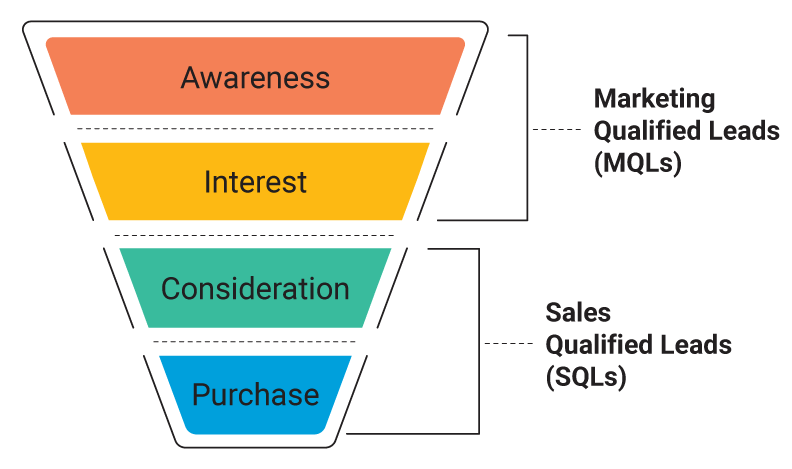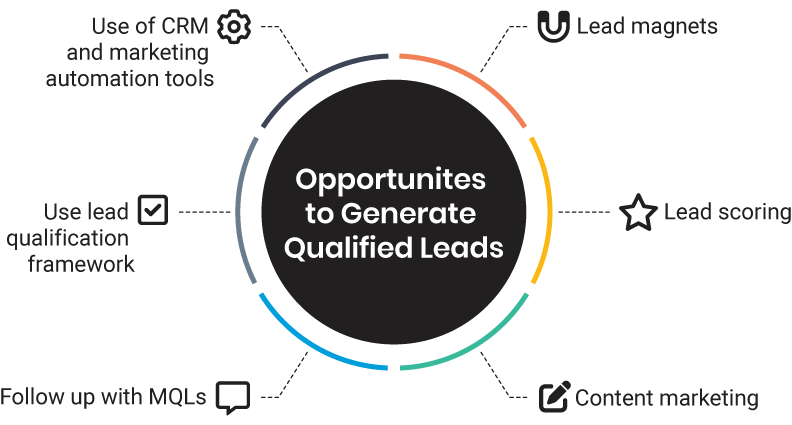Having fresh leads for your business is more important than ever for businesses looking to grow and thrive. With competition increasing across industries, s/he with a steady stream of new potential customers to reach out to will be the most successful.
Fresh leads provide a valuable source of new revenue and help a business expand its customer base. Additionally, having fresh leads allows a business to stay relevant and top-of-mind in their industry, and can help a company adapt to changes in the market.
In other words, no matter what type of business you’re in, you should be consistently looking for new ways to generate leads, whether through traditional methods like networking and advertising or through more modern techniques like digital marketing and social media. Ultimately, having fresh leads is essential for any business looking to succeed in the current marketplace.
The thing is, there are multiple lead types. How do you know what type of lead your business needs to attract?
It all begins when you understand the difference between a marketing qualified lead (MQL) and a sales qualified lead (SQL).
Let’s discuss!
Marketing Qualified Leads or MQLs
A crucial component of any successful lead generation and sales strategy, MQLs are leads that have been identified as having a higher likelihood of becoming paying customers than other leads that enter the top of your funnel. This qualification is based on specific criteria such as their level of engagement with your company’s marketing efforts and their level of interest in your products or services.
The importance of MQLs lies in the fact that they represent a more qualified and engaged group of leads than the majority that initially engage with your business via website visits, form submissions, email engagement, and social media interactions to name a few.
In focusing on MQLs, businesses can improve their sales conversion rates, increase revenue, and reduce the cost of customer acquisition. Additionally, by identifying MQLs early in the sales process, businesses can better target their marketing efforts and resources, resulting in more efficient and effective campaigns.
Additionally, by using tools like marketing automation and customer relationship management (CRM) software, businesses can track and analyze these interactions, and identify which leads are most likely to become MQLs.
Sales Qualified Leads or SQLs
These types of leads represent individuals or organizations that have been vetted and determined to have a genuine need or interest in a company’s products or services. They are even lower in the marketing funnel than an MQL.
SQLs are leads that have been qualified by the sales team and deemed ready for a direct sales pitch or presentation. They have shown interest and engagement in the company’s offering and have provided enough information to indicate they are a good fit for the product or service. In other words, they are more likely to convert into paying customers.
By identifying SQLs early in the sales process, businesses can better target their sales efforts and resources, resulting in more efficient and effective sales campaigns.
Generated through a variety of means, SQLs can be found by way of following up with MQLs, using lead scoring and lead nurturing techniques, or by using a lead qualification framework.
How MQLs and SQLs work together
Together, MQLs and SQLs work to form a fully viable sales pipeline for businesses by providing a clear and efficient process for identifying and qualifying leads.
Here’s how.

MQLs represent the early stages of the sales pipeline, where leads are first identified and engaged with through marketing efforts. These leads are then evaluated and qualified based on their level of engagement and interest in a company’s products or services.
Once leads are determined to be MQLs, they are then passed on to the sales team for further evaluation and qualification. This is where SQLs come in. The sales team uses their expertise and knowledge to determine which leads have the greatest potential for conversion and are ready for a direct sales pitch or presentation.
By working together, MQLs and SQLs provide a clear and efficient process for identifying and qualifying leads, which helps to ensure that the sales team is focused on leads that are most likely to convert into paying customers. This allows the business to be more efficient and effective with its sales efforts, resulting in higher conversion rates and increased revenue.
Ways to Find MQLs and SQLs for your business
Above, we shared some opportunities to generate MQLs and SQLs for your business, Now, let’s go into a little more depth regarding what that looks like. Here are six opportunities to generate qualified leads for your business.

- Lead magnets: Offer valuable resources such as e-books, webinars, or whitepapers in exchange for contact information. These lead magnets can be promoted through social media, email marketing, and other channels to generate MQLs.
- Lead scoring: Use lead scoring techniques to evaluate leads based on their level of engagement and interest in your products or services. Leads with the highest scores can be considered MQLs.
- Content marketing: Create high-quality, educational content that is relevant to your target audience. This can help to attract and engage potential customers, and generate MQLs.
- Follow up with MQLs: Once leads are identified as MQLs, it’s important to follow up with them to further engage and qualify them. This can include scheduling calls, sending personalized emails, or offering free trials or demos.
- Use lead qualification framework: Use a lead qualification framework to ask specific questions and gather specific information about the leads. This can help you understand if the lead is a good fit for your product or service and if they have a budget, authority and a need to buy.
- Use of CRM and marketing automation tools: Use customer relationship management (CRM) and marketing automation tools to track and analyze interactions with leads, and identify which leads are most likely to become MQLs and SQLs.
Measuring the success of your MQLs and SQLs
Measurements are important to understand the effectiveness of your lead generation and sales strategy. Key metrics to track when looking at MQLs and SQLs include conversion rate, lead-to-customer ratio, lead velocity rate, sales cycle length, marketing and sales-qualified lead cost, and engagement metrics. Knowing these will help you better understand which campaigns are driving the most MQLs and SQLs, this way you can identify areas for improvement and make adjustments as needed.
Let’s take a look at each of these measurements individually:

Conversion rate
Track the percentage of MQLs that convert into SQLs and the percentage of SQLs that convert into paying customers. This will give you an idea of how effective your lead qualification process is.

Lead-to-customer ratio
Track the ratio of MQLs to SQLs, and the ratio of SQLs to paying customers. This can help you understand how many leads you need to generate in order to acquire a new customer.

Lead velocity rate
Track how quickly leads move through your sales pipeline, from MQL to SQL to paying customer. This can help you identify bottlenecks or delays in your sales process.

Sales cycle length
Track the length of time it takes for a lead to move from MQL to SQL to paying customer. This can help you understand how long it takes to close a sale, and make adjustments to your sales process as needed.

Marketing and Sales-qualified lead cost
Track the cost of acquiring MQLs and SQLs, and compare it to the revenue generated from those leads. This can help you understand the return on investment (ROI) for your lead generation and sales efforts.

Engagement metrics
Track engagement metrics such as open rates, click-through rates, and form submissions for your lead magnets and marketing campaigns. This can help you understand which campaigns are driving the most MQLs and SQLs.
Lead generation is essential for any business looking to grow and thrive in today’s competitive marketplace. By generating a steady stream of new leads, businesses can expand their customer base, increase revenue, and stay relevant in their industry. MQLs and SQLs play an important role in the lead generation process by providing a clear and efficient way to identify and qualify leads. By tracking and analyzing key metrics, businesses can better understand the effectiveness of their lead generation efforts and make adjustments as needed. Ultimately, having a solid lead generation strategy in place is critical for any business looking to succeed in today’s marketplace.







